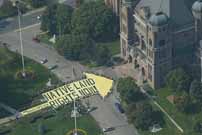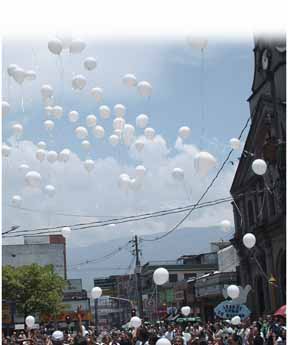Canadian Mennonite
Volume 11, No. 21
October 29, 2007
Native land rights now!
CPT congress sends strong message to Queen’s Park
TORONTO
 |
On Sept. 21—the International Day of Peace—peacemakers unfurled a 75-metre banner in the shape of an arrow pointing directly at the Ontario legislature at Queen’s Park. It read “Native Land Rights Now!” to send a message during the Ontario election campaign about unresolved conflicts involving aboriginal lands.
The action was a part of the ninth Christian Peacemaker Teams (CPT) congress, which was held for the first time in Canada, from Sept. 20-23 at Toronto United Mennonite Church. The public witness, co-sponsored by Rainforest Action Network (RAN), included the laying of 107 ribbons—one for each electoral riding in Ontario—as a symbolic call to candidates to remember and honour Ontario’s historic treaty commitments to indigenous people. A number of aboriginal groups were in attendance for the banner’s unfurling.
Prior to going to Queen’s Park, the 250 congress participants listened to a talk by Judy da Silva, spokesperson for the Asubpeeschoseewagong (Grassy Narrows) First Nation near Kenora, Ont. Grassy Narrows is maintaining the longest-standing blockade in Canadian history to stop Abitibi Consolidated from clear-cutting its traditional land use area. A RAN boycott campaign targeting Weyerhauser, the principal buyer of softwood fibre taken from Grassy Narrows’ territory, has resulted in the high-profile appointment of a former Supreme Court justice to negotiate land use issues between Grassy Narrows and the government of Ontario. However, the province has yet to abide by the moratorium against clear-cutting issued by Grassy Narrows in February of this year.
The congress also heard addresses from James Loney, co-director of CPT Canada and a former hostage in Iraq, as well as from Ricardo Esquivia, a prominent Colombian Mennonite peace activist and human rights lawyer.
Esquivia described the current situation in his country and encouraged CPT in its ongoing work and partnership with the Colombian Mennonite Church. Since February 2001, CPT has been accompanying rural communities caught in the midst of an ongoing conflict between the army, paramilitary groups and leftist guerillas.
While noting some positive developments within Colombia, such as overall economic growth, he expressed concern for the faltering process of paramilitary demobilizations, which seem destined to fail through inadequate resources and unreasonable timelines.
In the face of such daunting challenges, Esquivia spoke of how the Mennonite Church has helped to create ecumenical networks for peace primarily though an association of evangelical churches. Currently, 500 women across the country have been trained as peacemakers and there is a growing movement to make every congregation a “sanctuary of peace” within a culture deeply mired in injustice and violence.
More bread, less bullets
ARMENIA, COLOMBIA
 |
In the main plaza of this mid-sized city, Mennonite pastor Antonio Herrera warned listeners that, in a nation torn by conflict and violence, peace can’t be reached by a greater investment in the military. Rather, he said, “it is reached through more education, health care and more employment for all Colombians.”
Speaking through a megaphone as part of a Sept. 21 event called Pan y Paz, or “Bread and Peace,” he said that identifying the factors that contribute to the armed conflict is not enough. “As long as there are empty stomachs, there will always be violence in our country,” he said. “Peace is not obtained through more bullets, [but] with more bread we can reach peace.”
Sept. 21 is designated by the UN as a day of international peace, nonviolence and ceasefire. To honour the day, churches throughout Colombia hold Bread and Peace events, asking people to consider the link between peace and hunger, poverty and economic injustice.
In 45 celebrations throughout the country, the message was shared in neighbourhoods, parks, plazas, universities and street corners. Speakers called people to commit to a lifestyle embracing principles of nonviolence and highlighted the need for economic justice as the key to a lasting peace in Colombia.
In the capital, Bogotá, people took to the streets and plazas in 15 different Bread and Peace events. Teusaquillo Mennonite Church organized an ecumenical march, stopping at specific “stations” along the way, while using art, theatre and song to highlight the suffering and hope of the Colombian people. Representatives from Mencoldes, the development organization of the Colombian Mennonite Church, wore large, colourful boards calling attention to hunger and agriculture issues in Colombia.
The march, which drew at least 100 people, ended in a main plaza, where representatives from different churches led a liturgy, followed by an address by a UN representative and the sharing of 3,000 small bread loaves with the people in and around the plaza.
In Itagüe, as many as 4,000 people took part. Through the event, said pastor Jorge Gonzales, people see “the Christian church being more active in the reality of the country and more proactive in the search for solutions.”